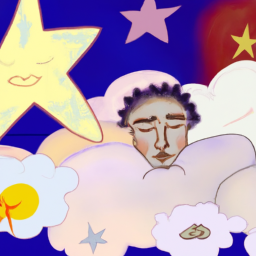Every night when I lie in bed, I find myself traveling to a unique universe. This is a realm where my thoughts can explore, create, and imagine without limits. It is the origin of dreams, a magical space that has fascinated humanity for centuries.
The science of sleep and the subconscious mind have been studied for decades, yet the mystery of dreams persists. From the history of dream interpretation to the types of dreams we experience, the topic of dreams is vast and complex.
In this article, we will explore the creative power of dreams and how they can be used for therapy, as well as their impact on emotional health. So, come with me on a journey into the world of dreams, where anything is possible and the only limit is our imagination.
Key Takeaways
- Dreams are a unique world without limitations.
- The subconscious mind holds hidden potential for creativity.
- Dream interpretation can provide insight into subconscious desires and fears.
- Dream exploration can unlock the secrets of the subconscious mind.
The Science of Sleep
You’re probably wondering why you wake up feeling groggy even though you slept for 8 hours. Well, let’s talk about the science of sleep and how it affects your daily life!
Sleep patterns are influenced by your circadian rhythm, which is your body’s internal clock that regulates when you feel awake and when you feel tired. This rhythm is controlled by a part of your brain called the suprachiasmatic nucleus, which responds to light and darkness to determine when you will feel sleepy or alert.
Your sleep pattern is also affected by your environment, such as the temperature, noise level, and comfort of your bed. Poor sleep quality can result in feeling tired during the day, difficulty concentrating, and even health problems such as obesity and heart disease.
It’s important to establish a consistent sleep schedule and create a comfortable sleeping environment to ensure a good night’s rest. With a healthy sleep pattern, you’ll have more energy to tackle your day and achieve your dreams.
Now, let’s explore the power of the subconscious mind.
The Subconscious Mind
When your mind drifts off into a different world, it’s like a secret garden waiting to be explored. Our subconscious mind holds hidden potential that we can tap into to unlock our creativity.
Here are three ways to harness the power of the subconscious mind:
-
Meditate: Give your mind a break from the constant chatter of your conscious thoughts. Meditation allows your subconscious mind to come to the forefront and reveal new ideas and solutions.
-
Dream journaling: Keep a journal by your bed and write down your dreams as soon as you wake up. Analyzing your dreams can help you uncover hidden desires and fears that may be holding you back in your waking life.
-
Visualization: Imagine yourself achieving your goals or living your dream life in vivid detail. This technique helps to program your subconscious mind with positive beliefs and outcomes.
By tapping into our subconscious mind, we can unlock our hidden potential and unleash our creativity.
In the next section, we’ll explore the history of dream interpretation and how it has shaped our understanding of the subconscious mind.
The History of Dream Interpretation
Now let’s dive into the fascinating history of interpreting dreams and how it can provide valuable insights into the workings of our subconscious mind.
Freud’s influence cannot be overlooked when discussing the history of dream interpretation. His book, ‘The Interpretation of Dreams,’ published in 1899, was a groundbreaking work in the field. Freud believed that dreams were a way for the subconscious mind to communicate its desires and fears. He saw dreams as a form of wish fulfillment, where the dreamer’s repressed desires were allowed to manifest themselves.
However, dream interpretation has not remained static since Freud’s time. Cultural variations play a significant role in how people understand and interpret their dreams. In some cultures, dreams are seen as messages from the gods or ancestors. In others, they are believed to be prophetic. Still, in others, they are simply dismissed as the random firing of neurons in the brain.
Understanding these cultural variations is essential in interpreting dreams accurately. Now, let’s explore the types of dreams and how they can shed light on our subconscious mind.
The Types of Dreams
There are various types of dreams, including lucid dreams, nightmares, and recurring dreams, that can provide insight into our subconscious desires and fears.
Lucid dreaming is a type of dream where the dreamer is aware that they’re dreaming and can even control the dream’s narrative. This type of dream can provide a sense of empowerment and can help individuals overcome fears or work through unresolved issues in their waking life.
Nightmares can be distressing and may prevent restful sleep. Fortunately, there are several techniques for nightmare prevention, including relaxation techniques, establishing a calming bedtime routine, and avoiding stimulating activities before bed.
Understanding the different types of dreams and their meanings can offer valuable insight into our subconscious desires and fears. By paying attention to the themes and emotions present in our dreams, we can gain a better understanding of ourselves and our motivations.
In the next section, we’ll explore the creative power of dreams and how we can harness this power to achieve our goals and aspirations.
The Creative Power of Dreams
You can harness the creative power of your subconscious mind through your dreams to achieve your goals and aspirations. Dreams aren’t just random and meaningless experiences that we have while we sleep. They hold the artistic potential to bring to life our deepest desires and aspirations.
It’s in our dreams that we can tap into the vast resources of our subconscious mind to create new realities for ourselves. The spiritual significance of dreams can’t be overstated. They’re a way for our higher self to communicate with us, to guide us toward our true purpose and destiny.
Our dreams can provide us with valuable insights and intuitive knowledge that we can use to make better decisions in our waking life. As we learn to pay attention to our dreams and interpret their meaning, we can unlock the full potential of our subconscious mind and start living the life we truly desire.
Dreams have a language that’s unique to each individual, and understanding the symbols and meanings in our dreams is key to unlocking their power. In the next section, we’ll explore how to interpret our dreams and uncover their hidden messages.
Dream Symbols and Meanings
Deciphering the hidden messages of dream symbols can be a powerful tool in exploring our subconscious mind. Symbolic interpretation of our dreams can help us understand our deepest desires, fears, and aspirations. By analyzing the meaning behind recurring dream patterns, we can gain insight into our own psyche and use this knowledge to bring our dreams to life.
To better understand the symbolism in our dreams, we can create a table that outlines the most common symbols and their possible meanings. Here is an example:
| Symbol | Possible Meaning |
|---|---|
| Water | Emotion |
| Flying | Freedom |
| Teeth | Anxiety |
| Snakes | Transformation |
| Death | Change |
By decoding the hidden messages in our dreams and understanding the symbolism behind them, we can unlock our subconscious mind’s creative potential and use it to achieve our goals. In the next section, we will explore how dream therapy can further aid us in this process.
Dream Therapy
When it comes to dream therapy, I find it fascinating how it can help people tap into their unconscious mind and explore their deepest emotions and thoughts.
There are different types of dream therapy, such as Gestalt therapy and Jungian therapy, each with its own approach and techniques.
While dream therapy can bring benefits such as self-awareness and emotional healing, it’s important to consider the potential risks and limitations as well.
How It Works
So, how exactly does this dream-making process work? Well, it all starts with understanding sleep patterns.
Dream therapy is a type of therapy that involves analyzing and interpreting a person’s dreams to gain insight into their subconscious thoughts and emotions. It’s based on the idea that dreams are a reflection of a person’s inner self and can provide clues to unresolved issues or conflicts.
To fully understand the process, it’s important to know the importance of dream analysis. Dreams can reveal hidden fears, desires, and conflicts that we may not be aware of in our waking life. By exploring these dreams with a therapist, individuals can gain a deeper understanding of themselves and their emotional state.
This can lead to personal growth, improved relationships, and a greater sense of self-awareness. Through dream analysis, therapists can identify patterns and themes in a person’s dreams, which can then be used to guide the therapeutic process.
This may involve exploring past experiences, discussing current issues, and working through emotions and feelings. Ultimately, dream therapy aims to help individuals better understand themselves and improve their mental and emotional well-being.
With this understanding, individuals can begin to explore different types of therapy that may be beneficial for their specific needs and goals.
Types of Therapy
Exploring different types of therapy is like searching for the key to unlock your inner potential and improve your mental and emotional well-being. Two popular types of therapy are cognitive behavioral therapy (CBT) and art therapy. CBT focuses on identifying negative thought patterns and behaviors, and replacing them with more positive ones. It is a structured and goal-oriented approach that is effective for treating anxiety, depression, and other mental health issues.
On the other hand, art therapy uses creative expression to help individuals process their emotions and explore their inner selves. This type of therapy does not require any artistic skills, and can involve anything from drawing and painting to music and dance. Art therapy is particularly effective for individuals who have difficulty expressing their feelings verbally. Both CBT and art therapy can be used alone or in combination with other types of therapy to help individuals achieve their mental and emotional health goals.
Moving on to the next section about the benefits and risks of therapy, it is important to note that therapy is not a one-size-fits-all solution. While it can be incredibly beneficial, it is important to consider the potential risks and drawbacks before embarking on a therapy journey.
Benefits and Risks
You may be wondering about the benefits and risks of therapy, so let’s take a closer look. Firstly, therapy can provide a safe space for individuals to express their emotions and thoughts without fear of judgment. This can lead to a greater sense of self-awareness and understanding, which can ultimately improve relationships and overall mental health.
Secondly, therapy can also provide practical tips and tricks for managing stress, anxiety, and other mental health concerns. These tools can help individuals cope with difficult situations and achieve their goals. However, it’s important to note that therapy may not work for everyone and there are potential risks involved, such as feeling emotionally vulnerable or uncomfortable. It’s important to discuss any concerns with a therapist before beginning treatment.
Moving on to the next section about dreaming and emotional health, it’s important to note that therapy can also play a role in exploring and understanding our dreams.
Dreaming and Emotional Health
Dreaming is like going on a therapeutic journey that can help improve emotional well-being. When we sleep, our mind and body take a break from the stressors of the day, allowing us to recharge and reset.
Dreaming during this time can provide a sense of mental clarity, helping us process emotions and thoughts that may have been suppressed during the day. It’s essential to prioritize rest and sleep to allow our minds to engage in this process.
Studies have shown that dreaming can have positive effects on emotional health. It can improve our overall mood and even aid in the treatment of mental health conditions such as depression and anxiety.
By allowing ourselves to dream, we can access our subconscious and work through challenging emotions that may be impacting our daily lives. Dreaming is an essential component of our emotional well-being, and prioritizing rest and sleep can help us access this therapeutic journey.
Moving forward, the future of dream research holds exciting possibilities for understanding the connection between dreaming and mental health. By continuing to study the brain’s activity during sleep, we can learn more about how dreams impact emotional regulation and cognitive functioning.
As we continue to prioritize rest and sleep, we can access the benefits of dreaming and improve our emotional well-being.
The Future of Dream Research
Get ready to dive into the exciting possibilities of understanding how dreams impact emotional regulation and cognitive functioning in the future! Dream technology is rapidly advancing, and researchers are discovering new ways to access and analyze dream content.
Brain imaging and monitoring devices allow us to observe the brain’s activity during sleep and analyze the content of dreams. With these tools, researchers hope to uncover the mysteries of dreaming and its impact on emotional health and cognitive functioning.
However, as with any technology, ethical considerations must be taken into account. The use of brain imaging and monitoring devices raises questions about privacy and consent. Researchers must ensure that the participants in their studies fully understand the nature of the research and give their informed consent. As dream technology continues to advance, it’s crucial that ethical guidelines are established to protect the privacy and well-being of participants.
As we explore the future of dream research, it’s important to remember the value of exploring your own dreams. By paying attention to the content of our dreams and reflecting on their meaning, we can gain insight into our own emotional health and cognitive functioning.
In the next section, we’ll delve into techniques for exploring your own dreams and using them to improve your well-being.
Exploring Your Own Dreams
I’ve found that exploring my own dreams can be a fascinating and insightful experience. One of the most helpful tools for this is keeping a dream journal, where I can write down my dreams as soon as I wake up.
Another technique that has worked for me is actively trying to remember my dreams by focusing on them before falling asleep and immediately upon waking up.
And for those who want to take it a step further, there are also tips and exercises for achieving lucid dreaming, where you can become aware that you’re dreaming and even control the dream itself.
Keeping a Dream Journal
Keeping a dream journal can improve sleep quality. Studies show that those who recorded their dreams slept better and felt more rested. Reflective writing is a powerful tool for personal growth, and keeping a dream journal offers a unique opportunity for self-reflection. Here are some compelling reasons why you should consider starting a dream journal today:
- Dreams offer valuable insights into our subconscious mind.
- Recording your dreams can help you identify patterns and recurring themes.
- Dream journals can serve as a source of inspiration for creative projects.
- Writing down your dreams can help you remember them more vividly.
By keeping a dream journal, you can tap into the wisdom of your inner self and gain a deeper understanding of your emotions, thoughts, and desires.
In the next section, we’ll explore some techniques for remembering your dreams so that you can make the most of your dream journal.
Techniques for Remembering Dreams
Recalling the details of your nighttime adventures may seem challenging, but with these simple techniques, you’ll be able to effortlessly remember your dreams.
One of the most effective techniques is visualization. Before going to bed, take a few minutes to visualize yourself remembering your dreams in the morning. Imagine yourself waking up and jotting down the details of your dream in your dream journal. This visualization exercise will help your subconscious mind to focus on remembering your dreams.
Another technique for remembering dreams is to practice dream recall exercises. As soon as you wake up, try to remember the details of your dream. Start with the last thing you remember and work your way backward. If you can’t remember anything, try to recall any emotions or sensations you felt during the dream. Once you have a few details, write them down in your dream journal.
The more you practice, the easier it will become to remember your dreams. With these techniques, you’ll be well on your way to unlocking the secrets of your subconscious mind and exploring your dream world.
Moving on to the next section, let’s explore some tips for achieving lucid dreaming.
Tips for Lucid Dreaming
Ready to take your dream exploration to the next level? Here are some tips for achieving lucid dreaming.
-
Practice meditation techniques. Meditation can help you relax and clear your mind, making it easier to enter into a lucid dream state. Try meditating for a few minutes before bed, focusing on your breath and letting go of any distracting thoughts.
-
Do reality checks throughout the day. This involves questioning whether you’re dreaming or awake, and looking for signs that you’re in a dream. For example, try pushing your finger through your palm or looking at a clock, then looking away and back again to see if the time has changed. By making a habit of reality checks, you’ll be more likely to recognize when you’re in a dream and take control of it.
-
Keep a dream journal. Writing down your dreams can help you remember them more vividly and identify patterns or themes. This can also help you become more aware of when you’re dreaming, making it easier to become lucid. Try to write in your journal as soon as you wake up, before you forget any details.
With these tips, you’ll be on your way to experiencing the magic of lucid dreaming. Remember to be patient and persistent, as it may take time and practice to achieve lucidity in your dreams.
Frequently Asked Questions
Are there any specific foods or drinks that can enhance dream activity?
I’ve found that incorporating lucid dreaming techniques and herbal remedies into my routine has enhanced my dream activity. Certain herbs like valerian root and chamomile can promote relaxation and vivid dreams. Experimenting with different methods can lead to exciting dream experiences.
Can dreams predict the future or give insight into past lives?
Dream interpretation is subjective and can provide insight into the subconscious mind. Lucid dreaming allows for control of the dream, but no scientific evidence supports prediction of the future or past lives through dreaming.
Is it possible to control or manipulate dreams?
Yes, it is possible to control and manipulate dreams. Lucid dreaming techniques, such as reality checks and visualization, can help. Keeping a dream journal also aids in awareness and recall of dreams.
Do certain people have a greater ability to remember their dreams than others?
Some individuals may possess a greater ability to recall their dreams due to various factors, such as lucid dreaming techniques and consistent dream journaling methods. It’s a skill that can be developed with practice and dedication.
How do dreams differ between cultures and societies?
I’ve noticed cultural variations in dreams. Societal influences shape our subconscious, and our experiences and beliefs can affect what we dream about. It’s fascinating to see how different cultures interpret and analyze their dreams.
Conclusion
As I reflect on the fascinating world of dreams, I’m struck by how much we have yet to discover about this mysterious aspect of our lives.
From the science of sleep to the creative power of dreams, there’s so much to explore and understand.
While we may never fully unravel the secrets of the subconscious mind, it’s clear that dreams play a powerful role in our emotional and psychological well-being.
Like a kaleidoscope of colors and patterns, our dreams offer a unique window into our innermost selves.
Whether we’re exploring our deepest fears or unleashing our wildest imaginations, there’s no limit to what we can experience in the realm of dreams.
So, as we continue to delve deeper into the science of sleep and the mysteries of the subconscious mind, let’s embrace the power of our dreams and all that they have to offer.










